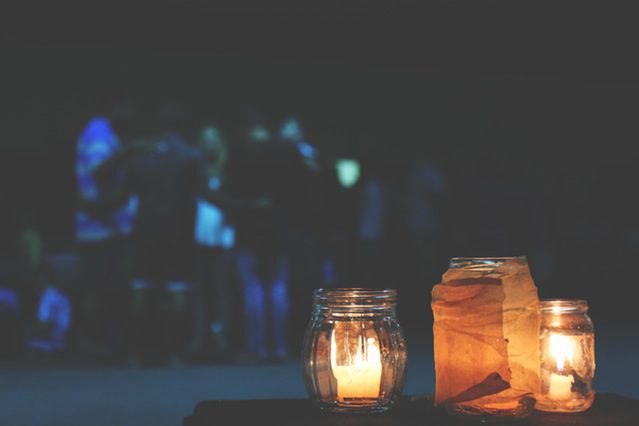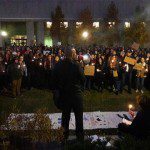In the year of King Uzziah’s death, I saw the Lord sitting on a high and exalted throne, the edges of his robe filling the temple. Winged creatures were stationed around him. Each had six wings: with two they veiled their faces, with two their feet, and with two they flew about.They shouted to each other, saying:
“Holy, holy, holy is the Lord of heavenly forces!
All the earth is filled with God’s glory!”
The doorframe shook at the sound of their shouting, and the house was filled with smoke.
I said, “Mourn for me; I’m ruined! I’m a man with unclean lips, and I live among a people with unclean lips. Yet I’ve seen the king, the Lord of heavenly forces!”
Then one of the winged creatures flew to me, holding a glowing coal that he had taken from the altar with tongs. He touched my mouth and said, “See, this has touched your lips. Your guilt has departed, and your sin is removed.”
Then I heard the Lord’s voice saying, “Whom should I send, and who will go for us?”
I said, “I’m here; send me.” –Isaiah 6:1-8
You may feel like the America you went to bed in last Sunday night is not the same one you woke up in this Sunday morning… As if some painful shift in the universe pushed us back 100 years, and forward to some dystopian future, all at the same time.
I don’t want to assume that’s how everybody feels this morning, or that everyone here cast identical ballots. Life is not that simple. Community is not that simple. And, can I get a witness, most of our extended families are not that simple. We do not have to all hold the same political views to be church together. Our faith is big enough for complexity, and does not call us to toe a party line.
But as we move forward together and learn to navigate a world that is maybe not the one we thought it was–and as we try to understand and co-exist with those who hold opposing views–we are all called to reject the kinds of hate speech and violence that have escalated in communities and schools since last Tuesday. From high school here in Olathe, to a college in Kentucky, to the more than 200 instances reported to the Southern Poverty Law Center in just the past few days… It is a litany of acts of violent aggression, verbal attacks, and relentless bullying against Muslims, immigrants, and people of color.
Whatever the next 4 years hold on a global scale, we know one thing is true–local communities need unified voices, more than ever, to speak against hate, bigotry, and fear of neighbor.
This congregation is uniquely equipped to answer that call– because we have always been that voice.

We’ve been affirming of LGBT people and their rights since the church started; we’ve partnered with Muslims; we’ve advocated for nonviolence; and just in the past 6 months, we’ve started two new ministries–Showing Up for Racial Justice (SURJ) and Hand of Welcome, our new refugee ministry.
Is it a coincidence that our newest commitments to our neighbors reach some of the very people who are being victimized in the current climate? Or is it evidence of some prophetic foresight on the part of Saint Andrew’s leadership?
In Isaiah chapter 6, the people are facing the death of beloved King Uzziah, who had a long and peaceful reign. His death leads to a great deal of anxiety and uncertainty– questions regarding stability and peaceful transition. (Transition makes people nervous). The Judeans here face the threat of takeover by the Assyrian Empire. In the opening verses of these passage, the prophet brings comfort in assurance–though earthly leadership is under transition, the God’s reign is secure.
I don’t want to overdraw the connection here; just because there is a political transition in play doesn’t mean it’s a direct reference to our own time. For one thing, Judah is a pretty small faction, not a powerful global presence. For another thing… well, this was written a long dang time ago. Scripture was written for a particular people in a particular time and place. We can’t always extract a passage and apply it to our own context that neatly. I’ve seen some really terrible theology happen when people try to do that.
Even so, there are some striking similarities. And God calls the prophet Isaiah, just as God has always called on faithful people in troubled times. The call is simple… Worldly powers are in chaos, the people need leadership ,and God wants to know: Who will go for us? Whom shall I send?
And Isaiah says… Here I am. Send me.
I can’t hear this response without also hearing the voice of my seminary professor in my head. Dr. Davison used to always remind us that any time a person answers God by saying “here I am…” Well, it’s not going to be good. Things are probably not going to end well for them. Answering the call of God is a scary thing.
And yet.
Church, this is clearly our “Here I am” moment. It’s not comfortable, and it may not be safe. But when we think about who is vulnerable right now, who needs a voice and an advocate, –it’s the very same people we’ve been ‘for’ all along. The immigrant, the poor, the marginalized… We can say “here I am,” because we have been here–right here, doing this work, preparing for this moment.
Our call right now is the same as it has been–to be a voice for those with little power, to serve the poor, and to share the good news of Christ’s love in real, tangible ways, not in sound bites or memorized scripture. That has not changed. Maybe that work feels heavier now. But it is where we’ve always been.
There is a certain call, though, that maybe we should hear with a little more urgency. And that is the call to widen our circles and be bold with our invitation.
All over this country, and right here in our own town, there are an awful lot of people who are feeling distinctly unsettled in their churches. Feeling like maybe there is no place for them, their voice, their hard questions, or their non-traditional family.
Some are leaving churches, not because of any particular message, but for the lack of a meaningful stance on anything. I feel for my clergy colleagues who are trying to hold a diverse array of views and walk a thin line of unity…They are giving leadership in very difficult circumstances and leading as gracefully as they can. But many people are weary of silence and need their faith community to say something that will help them navigate this complicated world.
I’m not just speculating. I’ve witnessed it in my own circles–friends I haven’t seen in years sending me notes, asking if I can help them find a church “like mine” in their area. But this is part of a wider phenomenon. I read an article recently about a growing rift in evangelical church that will not be easily healed after this election. Many women in those circles don’t feel safe there anymore, when their male leaders excuse rape culture; many people of color do not feel a sense of belonging when their white leaders overlook overt racism. And young, millenial evangelicals… well they are just tired of fighting about gay marriage. They do not care. They want to serve the poor; address climate change; love their neighbors and focus on the work of the gospel, without all the culture war baggage.
“So basically” (I said to a friend) “They’re Disciples who like praise music.. We can work with that!”
Look around. This particular time in our history could be a pivotal, defining moment for the Church in general; and for our progressive churches in particular. Lots of folks are looking for a safe place: for doubt; for wrestling with difficult issues; and for having intentional conversations about complex social change. They’re looking for a place where it’s ok not to fit the mold. Those are our people!
So how are they going to know we’re here?
A lot may be uncertain right now. But we know who we are. And who we’ve always been, is exactly what the world needs right now. When God says “Who will go for us?” we can answer that we’re already here. We’ve got a long way to go, but we are already in place; ready to double down on our commitment to be a church of the open table, where all really means all.
We could do an epic ad campaign–t-shirts, bumper stickers, giant signs with catchy slogans, splurge on a radio spot that’s long enough to say more than our name… But the truth is, none of that will be nearly as effective as each of you, reaching out to people in your circles. Being open about your views on refugees, LGBT rights, and racial reconciliation. When you find a moment to engage on these issues, be clear that your beliefs are not in spite of your faith, but because of it.
When our kids are the ones stepping in and saying no to racially-motivated bullying; when our church is the one consistently showing up for gay rights and immigrants and racial justice; when we embody care of the earth as a core part of our mission; when each of you befriend your neighbors who might be fearful right now, tell them that you are with them; when we honor the full personhood of women in leadership; in all these ways, every day, you embody the gospel, and the message of your church, better than any catch phrase or sermon series we could dream up.
So I don’t want to hear anybody talk about moving to Canada, is what I’m saying. Yes, idea of a Saint Andrew North satellite campus in Calgary is tempting… But how could we leave? How could we leave this place, when it is so abundantly clear that God has called us for just such a time as this? For precisely this moment in history, and this little point on the map.
Many are preaching about unity today. And I understand that. Some places will have to heal the divides in their own community before they move forward. But whoever you voted for, you know that we do not have make room for hate. We are not going to water down our message of inclusion and radical love for the sake of a surface politeness. That is not church, that is bridge club. That is not the Kingdom of God, that is a Hallmark movie. That is not the gospel we know. That is not who God called us to be.
I don’t have a great “inspirational” story to wrap this all up today. I guess you’re going to have to get out there and make those transformative moments happen. Come back and tell us about it.
In the meantime, I do have a word from the poet W.H. Auden; shared by Bill Moyers this week, a much needed reminder of the importance of our poetic, prophetic voices:
Defenseless under the night
Our world in stupor lies;
Yet, dotted everywhere,
Ironic points of light
Flash out wherever the Just
Exchange their messages:
May I, composed like them
Of Eros and of dust,
Beleaguered by the same
Negation and despair,
Show an affirming flame.
An affirming flame… That sounds like something we know how to do. That sounds like a truth for right here, where we are. Right where we’ve always been.












